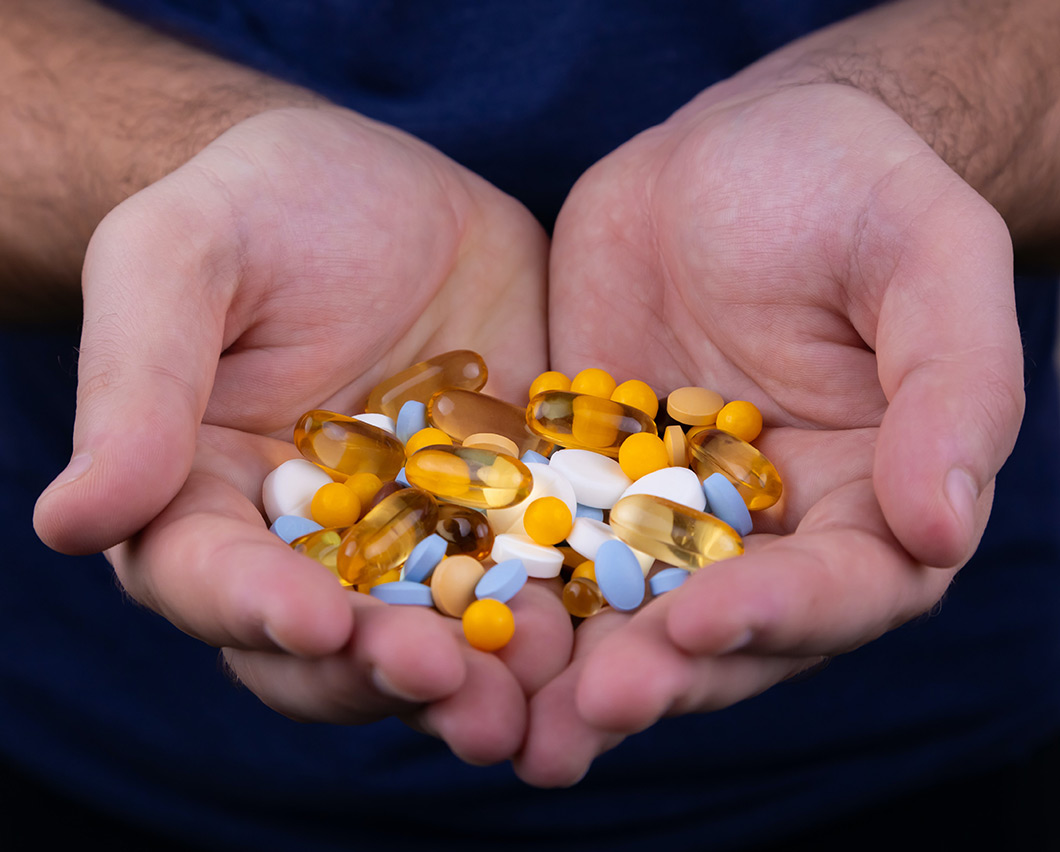MyPharmaGenes®

PHARMACOGENETICS: VARIABILITY IN DRUG RESPONSE
Genetics contributes to individual differences, not only in characteristics such as height or skin colour but also at the pharmacological level. Pharmacogenetics studies the relationship between genetic variability and how we respond to drugs. This information assists doctors in therapeutic management, which includes selecting active compounds and adjusting doses. The ultimate goal of this approach is to maximize therapeutic effects and minimize the risk of side effects.
MyPharmaGenes® is a comprehensive pharmacogenetic test designed to create a personalized pharmacological plan. This test evaluates 121 drugs commonly used in various medical specialities, namely:
Psychiatry
Neurology
Pain management
Cardiology
Oncology
Gastroenterology
Immunosuppression
Rheumatology
Urology
Infectiology
An interactive WebApp
MyPharmaGenes® is supported by an interactive WebApp where patients can:
- Manage their own drug portfolio;
- Register drugs that have triggered side effects;
- Have rapid access to which drugs may or may not be recommended for them;
- Find more specific information regarding the genes evaluated.
MyPharmaGenes® is indicated for:
- Patients who are starting new therapies;
- Patients who are not achieving therapeutic goals and/or experience moderate to severe adverse effects with the current therapy;
What is analysed?
The MyPharmaGenes® test analyses genetic variants associated with the metabolism and response to specific drugs, scientifically validated and with proven clinical utility.
MyPharmaGenes® highlights:
- Coverage of 121 drugs;
- Evaluation of 28 genes and 85 genetic variants;
With the evaluation of the patients’ genotypic profile is it possible to:
- Prescribe more adequate drug dosages;
- Evaluate the patient’s response to the treatment;
- Avoid/minimise adverse drug reactions;
- Select alternative agents, if necessary.
And, consequently, offer better treatment to more patients.
Drugs evaluated by therapeutic areA
-
Amitriptyline, Amoxapine, Amphetamine, Aripiprazole, Atomoxetine, Brexpiprazole, Bupropion, Citalopram, Clobazam, Clomipramine, Desipramine, Diazepam, Doxepin, Escitalopram, Flibanserin, Fluvoxamine, Haloperidol, Iloperidone, Imipramine, Nortriptyline, Paroxetine, Perphenazine, Pimozide, Protriptyline, Quetiapine, Risperidone, Sertindole, Sertraline, Thioridazine, Trimipramine, Venlafaxine, Vortioxetine, Zuclopenthixol
-
Brivaracetam, Carbamazepine, Deutetrabenazine, Donepezil, Eliglustat, Phenytoin, Fosphenytoin, Galantamine, Lamotrigine, Meclizine, Oxcarbazepine, Pitolisant, Siponimod, Tetrabenazine, Tolperisone, Valbenazine
-
Carisoprodol, Celecoxib, Codeine, Flurbiprofen, Hydrocodone, Ibuprofen, Lofexidine, Lornoxicam, Meloxicam, Methadone, Oliceridine, Piroxicam, Tenoxicam, Tramadol
-
Acenocoumarol, Atorvastatin, Clopidogrel, Ethinyl estradiol, Phenprocoumon, Flecainide, Fluvastatin, Hydrochlorothiazide, Losartan, Lovastatin, Metoprolol, Pitavastatin, Pravastatin, Propafenone, Ranolazine, Rivaroxaban, Rosuvastatin, Simvastatin, Warfarin
-
Capecitabine, Cisplatin, Erlotinib, Fluorouracil, Irinotecan, Mercaptopurine, Ondansetron, Pazopanib, SN-38, Tamoxifen, Tegafur, Thioguanine, Tropisetron
-
Dexlansoprazole, Dronabinol, Lansoprazole, Metoclopramide, Omeprazole, Pantoprazole, Rabeprazole
-
Azathioprine, Etanercept, Methotrexate, Tacrolimus
-
Lesinurad
-
Darifenacin, Fesoterodine, Mirabegron, Tamsulosin, Tolterodine
-
Abacavir, Atazanavir, Efavirenz, Flucytosine, Flucloxacillin, Nevirapine, PEG interferon-? + ribavirin, Ombitasvir + paritaprevir + ritonavir, Voriconazole
Scientific Studies
[2] Steve Connor (2003) “Glaxo chief: Our drugs do not work on most patients”, Independent/UK, 8/12/2003.
[3] Spear, B.B., Heath-Chiozzi, M. & Huff, J., “Clinical Application of Pharmacogenetics”. Trends Mol Med 7.5 (2001):201-204.
[4] Böhm, R. & Cascorbi, I., “Pharmacogenetics and Predictive Testing of Drug Hypersensitivity Reactions”. Front Pharmacol 7 (2016): 396.
[5] Lauschke, V.M., Milani, L. & Ingelman-Sundberg, M. “Pharmacogenomic Biomarkers for Improved Drug Therapy—Recent Progress and Future Developments”. AAPS J 20.1 (2018): 4.
[6] Gaedigk, Andrea, et al. “Characterization of Reference Materials for Genetic Testing of CYP2D6 Alleles: A GeT-RM Collaborative Project”. J Mol Diagn 21.6 (2019): 1034-1052.